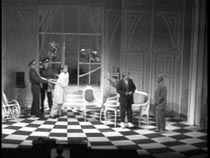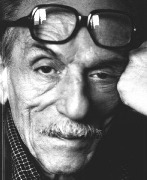
|
|
 |

Eduardo De Filippo
Biography
Eduardo De Filippo was born on 24 May 1900, the son of actor Eduardo Scarpetta and Luisa De Filippo. He made his debut in 1904 as a Japanese child in La geisha, written by his father. In 1914 he joined the regular staff of his step-brother's theatre company, where he stayed until 1920 when he was called up for military service. In 1922, on completing his military service, he resumed his acting career in the theatre. In 1931, together with his brother Peppino and sister Titina, he founded the theatre company Teatro Umoristico I De Filippo, an enterprise that was to continue until 1944. During this period he penned works such as Natale in casa Cupiello (1931) and Chi è cchiù felice 'e me? (1932). He also embarked upon an intense film career, appearing in Tre uomini in frack (1932) by Mario Bonnard, followed by Il cappello a tre punte (Three Cornered Hat) (1934) by Mario Camerini and Quei due (1935) by Gennaro Righelli. In 1945 he wrote Napoli milionaria (Naples Millionaire) and finally parted ways with Peppino due to artistic disagreements. He then founded the Compagnia di Eduardo, which in 1946 staged Questi fantasmi (Ghosts - Italian Style), followed shortly afterwards by the hugely successful Filumena Marturano, which was to become the most famous role of his great actress sister Titina. Several other works followed. Le bugie con le gambe lunghe (1947), La grande magia (1948), Le voci di dentro (1948) and La paura numero uno (1951) were further additions to an increasingly extraordinary repertoire. Works for the cinema included Assunta Spina (Scarred) (1948, directed by M. Mattoli), Napoli milionaria (1950), Filumena Marturano (1951), L'oro di Napoli (Every Day's a Holiday) (1954, directed by V. De Sica) and Fantasmi a Roma (Phantom Lovers) (1960, directed by A. Pietrangeli). In 1958 Filumena Marturano was staged in Moscow under the direction of R. Simonov, followed in 1962 by Il sindaco del rione Sanità. In 1964, he wrote L'arte della commedia, which was likened to Molière's L'impromptu. In 1973 he staged Gli esami non finiscono mai. The same year Sabato, domenica e lunedì (Saturday, Sunday, Monday), directed by Franco Zeffirelli and starring Laurence Olivier, was put on at the Old Vic theatre in London. In November 1980 he received an honorary degree in letters from the University of Rome and in 1981 was appointed a life senator. He died in Rome in 1984.



